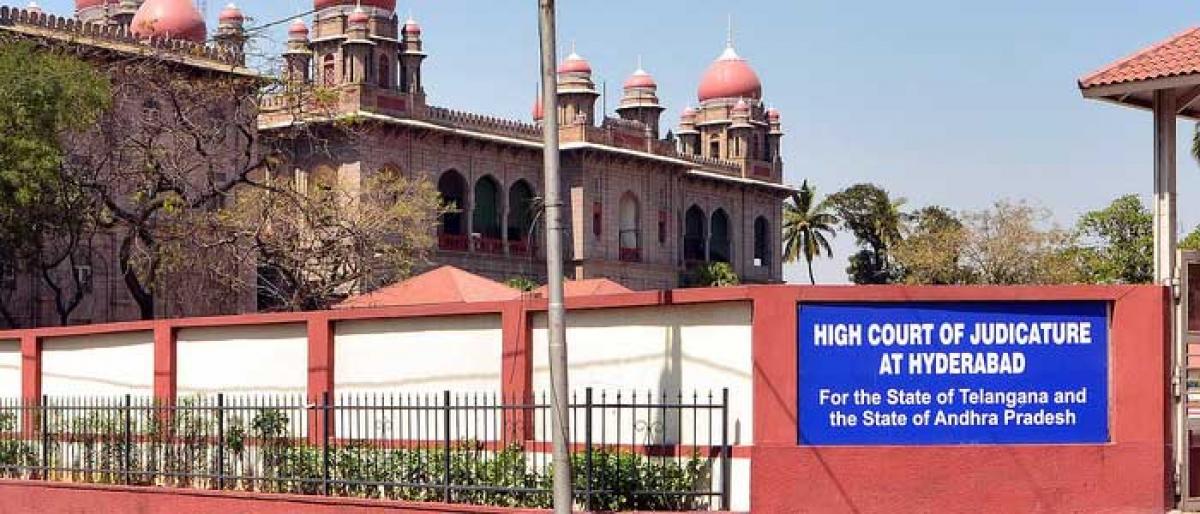Live
- Minister Nara Lokesh Pays Emotional Tribute to Late Nara Rammurthy Naidu
- Bihar: Deceased patient's eye missing, RJD condemns incident at Nalanda Medical College
- Rammurthy Naidu's Last Rites Held in Naravari Palli
- PM Modi receives ceremonial welcome in Abuja, begins bilateral talks with Nigerian President Tinubu
- Goods traffic doubles on the new railway freight corridors
- BGT 2024-25: I’d like to see him make one more Test ton in Australia, says Johnso
- Harassment due to ED raids forced Kailash Gehlot to quit, hints Kejriwal
- Kailash Gehlot exit: BJP goes on the offensive against 'corrupt' AAP govt
- PM Modi pays homage to ‘the great’ Balasaheb Thackeray on his death anniversary
- One who cares for Delhi will not stay with gang of robbers: Sachdeva on Gahlot's resignation
Just In

The High Court at Hyderabad gave a green signal to common counselling at National level for admissions into medical post graduate and super specialty courses, including under NTR University of Health Sciences and Kaloji Narayana Rao University of Health Sciences in Andhra Pradesh and Telangana respectively. With this, the medical graduates from other states would be eligible to take admissions int
Hyderabad: The High Court at Hyderabad gave a green signal to common counselling at National level for admissions into medical post graduate and super specialty courses, including under NTR University of Health Sciences and Kaloji Narayana Rao University of Health Sciences in Andhra Pradesh and Telangana respectively. With this, the medical graduates from other states would be eligible to take admissions into the colleges in the two Telugu states.
The Division Bench comprising of Justice V Ramasubramanian and Justice T Rajani in an elaborate 53-page interim judgment delivered on Thursday gave this green signal by vacating its earlier stay on common counselling given on 17th of this month. The Bench directed the Central Government to withdraw the orders of August 18 by which allotment of seats to the students from the two Telugu states in colleges in other states was cancelled.
Dr Satish Kumar and 12 other medical post graduates challenged the order issued by Union Health Ministry on May 4 stipulating that the seats under NTR University and KNR University would also be filled up in the national counselling of NEET.
The petitioners contended that this is illegal as the two states are covered by Article 371-D and Presidential Order that granted special provisions for local candidates in filling up seats in the professional colleges in the erstwhile Andhra Pradesh. Some other petitions were also filed challenging the denial of seats in other states to students from Telugu states.
All these petitions were clubbed and heard together by the Bench and a common order was passed on Thursday. The interim judgment while noting that the continued applicability of Article 371-D and the Presidential Order to the states of Telangana and Andhra Pradesh are questions of larger import that can be decided in the main writ petitions, however, spoke its mind on this issue thus: “As a matter of fact, as rightly predicted by the Supreme Court in Pradeep Jain case, a large chunk of students in the States of Andhra Pradesh and Telangana have now become victims of the very benefit for which they fought and got over 40 years ago.
If ‘x’ number of seats are available in all State-wide Educational Institutions and State-wide Universities in the States of Andhra Pradesh and Telangana, the opportunities available in the rest of the country for the eligible students of Andhra and Telangana are many times more than that figure. Therefore, holding on to Article 371-D and the Presidential Order, has today proved to be more of a liability than of an asset.”
The judgment also used a metaphor saying that what was intended only to be a partition wall within the house, cannot be transformed into a compound wall and raised to the level of Berlin Wall. It noted that Article 371-D was conceived as a tool for removing regional imbalances within the State of Andhra Pradesh and not for the purpose of removing any inequalities that the people of Andhra Pradesh suffered vis a vis the people of the other States in the country. “The elevation of the protection under Article 371-D to the National level, was never contemplated by Parliament.”
The judgment also noted that the insertion of Article 371-D in the Constitution could not keep the flame of independence of the people of Telangana subdued for more than 40 years. Agitations were held after 2009, eventually leading to the creation of the new State of Telangana under the Andhra Pradesh Reorganisation Act, 2014.
By: N S Arjun

© 2024 Hyderabad Media House Limited/The Hans India. All rights reserved. Powered by hocalwire.com







